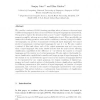Free Online Productivity Tools
i2Speak
i2Symbol
i2OCR
iTex2Img
iWeb2Print
iWeb2Shot
i2Type
iPdf2Split
iPdf2Merge
i2Bopomofo
i2Arabic
i2Style
i2Image
i2PDF
iLatex2Rtf
Sci2ools
ALT
2005
Springer
2005
Springer
Learning Multiple Languages in Groups
We consider a variant of Gold’s learning paradigm where a learner receives as input n different languages (in form of one text where all input languages are interleaved). Our goal is to explore the situation when a more “coarse” classification of input languages is possible, whereas more refined classification is not. More specifically, we answer the following question: under which conditions, a learner, being fed n different languages, can produce m grammars covering all input languages, but cannot produce k grammars covering input languages for any k > m. We also consider a variant of this task, where each of the output grammars may not cover more than r input languages. Our main results indicate that the major factor affecting classification capabilities is the difference n − m between the number n of input languages and the number m of output grammars. We also explore relationship between classification capabilities for smaller and larger groups of input langu...
Related Content
| Added | 14 Mar 2010 |
| Updated | 14 Mar 2010 |
| Type | Conference |
| Year | 2005 |
| Where | ALT |
| Authors | Sanjay Jain, Efim B. Kinber |
Comments (0)

